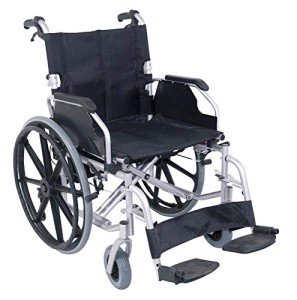Why Bariatric Folding Wheelchair Is Your Next Big Obsession?

Bariatric Folding Wheelchair
Bariatric folding wheelchairs are created to accommodate users of a larger size. They include a greater weight capacity than standard models and are built with enhanced materials for added stability and longevity.
However, not everybody with a high body mass index (BMI) requires a bariatric chair as lots of fall within the safe weight limitations of standard wheelchairs.
Size and Weight Capacity
Bariatric wheelchairs have larger seats and are created to accommodate larger individuals, usually weighing up to 500 pounds. My Mobility Scooters have a sturdy frame made from enhanced materials like steel and are built with bigger wheels that supply more weight circulation and maneuverability for larger users.
When comparing bariatric wheelchairs, make certain the weight capacity is noted as fixed or active load. Fixed weight capacity refers to just how much a chair can hold when it's sitting still, while active load capacity is identified by putting the chair through a drop test that imitates someone plopping down into the seat.
Standard wheelchairs are widely produced and developed for users with average body weights, making them more economical than bariatric designs. Medicare and other insurances might only cover a minimal number of bariatric wheelchairs, depending on a patient's medical needs and diagnosis. These chairs are also more pricey than basic wheelchairs since they have a specific style and building. Nevertheless, they are an excellent service for patients with a wide variety of medical conditions that need a more comfortable travel experience.
Seat Dimensions and Comfort
Unlike basic wheelchairs, bariatric models have wider seats to accommodate larger individuals. They also have more robust frames and large, durable wheels that can hold up against higher loads. They can be customized with numerous seating alternatives and accessories based upon the user's requirements and choices.
When comparing wheelchairs, it's crucial to take a look at their weight capacities under both fixed and active load rankings. Static load describes the chair's optimum capacity when it's sitting still, while active load steps just how much a wheelchair can safely hold when somebody beings in it and moves. Some manufacturers may likewise display the weight limit of a bariatric wheelchair in kilograms, which is frequently more precise since it considers the average bodyweight of a person who uses the chair.
In addition to a wide seat, a bariatric folding wheelchair needs to have adjustable cushioned leg rests to help users remain comfortable while traveling. It ought to also have flip up armrests that can be vacated the way to prevent getting in the user's method when they wish to stand up or transfer to another surface area.
If you're considering a bariatric wheelchair, ask a doctor or mobility professional for recommendations. They can assess your needs, suggest the right chairs for you, and guide you through the process of purchasing one. They can likewise help you compare features and costs to discover a wheelchair that best fits your budget. They can even offer advice on other mobility options such as power placing systems and iLevel seating.
Weight and Portability

While standard wheelchairs are typically budget-friendly, bariatric chairs tend to be a bit more costly. This is due to their specialized style and building and construction, in addition to the reality that they're a little much heavier than their counterparts.
If you're worried about the cost of a bariatric chair, speak with a health care company or mobility specialist. They'll be able to assess your unique needs and identify which kind of wheelchair is the best fit for you. They can also recommend wheelchair devices based on your specific requirements. Furthermore, if you're looking to get your wheelchair covered by insurance, such as Medi-Cal, they can guide you on the steps included in this procedure. To find out more, read our guide to wheelchair insurance protection. Then, you can start your journey towards independent mobility.
Manoeuvrability and Handling
Picking the right wheelchair can be a crucial choice for those with restricted mobility. Bariatric wheelchairs provide increased weight capabilities and are designed to accommodate bigger people. They generally feature bigger wheels, larger armrests and seating alternatives, and are sturdier than basic wheelchairs.
When choosing a bariatric wheelchair, consider the person's specific needs and the environment in which they will be using it. Assess the weight capacity and seat measurements, and try to find adjustable features like cushioned raising leg rests to support comfort and ease of transfer.
Figure out whether the wheelchair is appropriate for manual or powered usage. For added versatility, a bariatric folding wheelchair can be quickly folded and compressed for storage or transport. This makes them an ideal option for those with limited home space or who need to travel cross countries. The wheelchairs likewise feature leak evidence wheels to ensure sturdiness and low upkeep. Ideal for users approximately a maximum of 35 stone.
